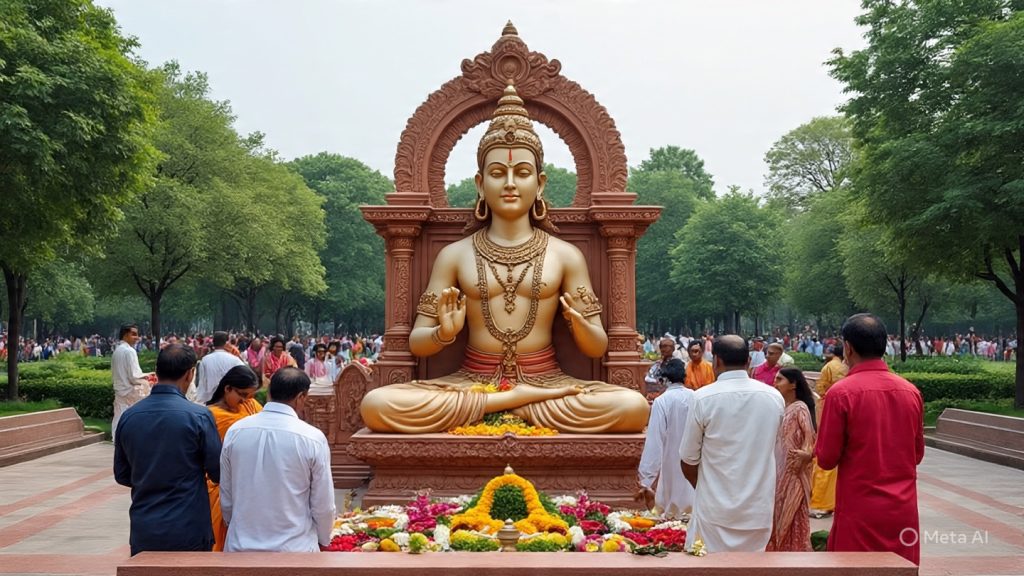Introduction
The world today is full of advancements—technology, science, and global connectivity have made our lives faster and easier. Yet, at the same time, we see more stress, violence, intolerance, and environmental destruction. In such a world, the teachings of Lord Neminath Swami, the 22nd Tirthankar of Jain Dharma, shine like a guiding light.
Though Neminath lived thousands of years ago, his wisdom is not limited to the past. His principles are timeless truths that apply to every age. If practiced sincerely, they can solve many of the modern problems we face today.
In this blog, we will explore how Neminath’s teachings—Ahimsa, Anekantavada, Aparigraha, Truthfulness, and Self-Discipline— can transform our personal lives, society, and even the planet.
1. Ahimsa (Non-Violence) in Today’s World
Violence is one of the greatest challenges of modern times. Wars, terrorism, domestic violence, cruelty to animals, and destruction of nature are all forms of himsa (violence).
Neminath’s teaching:
“Ahimsa Parmo Dharma” – Non-violence is the supreme religion.
Non-violence does not mean only avoiding physical harm but also avoiding hurtful speech and negative thoughts.
Modern Relevance:
- For Peace: If nations adopt Ahimsa, wars can be replaced with dialogue and cooperation.
- For Relationships: Non-violence in speech and behavior creates harmony in families and workplaces.
- For Animal Welfare: Neminath’s deep compassion for all living beings inspires vegetarianism and veganism.
- For Ecology: Reducing violence against nature ensures sustainability.
2. Anekantavada (Many-Sided Reality) and Tolerance
In today’s world, people often fight over religion, politics, or personal opinions. Intolerance has become a major cause of conflict.
Neminath’s teaching:
Truth is many-sided. Just like an elephant described differently by blind men, reality can be seen in different ways.
No single viewpoint is complete.
Modern Relevance:
- Religious Harmony: Anekantavada teaches us to respect other faiths.
- Political Peace: Encourages dialogue instead of hatred.
- Social Harmony: Promotes acceptance of diversity—cultural, racial, or personal.
- Personal Growth: Helps us remain humble and open-minded.
3. Aparigraha (Non-Possessiveness) in a Materialistic Age
Today, consumerism drives people to accumulate more—bigger houses, luxury cars, and endless possessions. Yet, more wealth often brings more stress, not happiness.
Neminath’s teaching:
Possessions bind the soul through attachment and desire.
True peace comes from simplicity and detachment.
Modern Relevance:
- Mental Health: Minimalism reduces stress and anxiety.
- Environment: Consuming less reduces pollution and saves resources.
- Society: Aparigraha reduces greed, leading to less corruption.
- Personal Life: Simplicity leads to freedom and contentment.
4. Satya (Truthfulness) in the Age of Fake News
In today’s digital world, misinformation spreads quickly. Lies are used in politics, business, and even personal life.
Neminath’s teaching:
Speak only the truth, and speak it in a way that does not hurt others.
Truthfulness is the foundation of trust.
Modern Relevance:
- Media: Truthful reporting builds a healthier society.
- Relationships: Honesty strengthens love and trust.
- Business: Ethical practices ensure long-term respect.
- Spiritual Growth: Speaking truth purifies the soul.
5. Self-Discipline and Simplicity
Today, people chase instant pleasures—junk food, addictions, distractions, and over-consumption. Lack of discipline leads to poor health and unhappiness.
Neminath’s teaching:
Self-control is the key to spiritual progress.
Fasting, meditation, and discipline purify the mind and body.
Modern Relevance:
- Health: Discipline prevents diseases.
- Focus: Meditation reduces stress and improves productivity.
- Inner Strength: Self-control builds resilience against negativity.
6. Jainism’s Ecological Wisdom for Today’s Planet
Climate change and environmental destruction are among the biggest threats to humanity today.
Neminath’s teaching:
Every living being—humans, animals, plants, even microbes—has a soul.
We must live in harmony with nature, not exploit it.
Modern Relevance:
- Vegetarianism & Veganism: Reduces cruelty and carbon footprint.
- Eco-Friendly Living: Encourages conservation of natural resources.
- Global Movements: Supports sustainable development.
7. Lessons for Inner Peace in a Busy Life
Modern people are constantly busy—emails, meetings, deadlines, social media. Stress and anxiety are common.
Neminath’s teaching:
Peace comes from within, not from possessions or achievements.
Silence, meditation, and detachment are the real treasures.
Modern Relevance:
- Mindfulness: Meditation helps reduce anxiety.
- Balance: Simple living keeps life peaceful.
- Happiness: Inner peace is greater than external success.
An Inspiring Example
It is said that when Lord Neminath was about to marry, he heard the cries of animals kept for sacrifice at the wedding feast. Out of deep compassion, he renounced worldly life immediately and chose the path of non-violence.
This story shows us how to handle challenges:
- Choose compassion over cruelty.
- Value every living being.
- Respond with love and selflessness.
Conclusion
Lord Neminath’s teachings are not just ancient spiritual principles; they are practical solutions for today’s problems. Whether it is non-violence for peace, tolerance for harmony, simplicity for happiness, truthfulness for trust, or compassion for ecology, his wisdom is timeless.
In a world of stress, violence, and greed, Neminath’s voice reminds us:
🌿 “Live peacefully, respect all beings, and walk the path of truth.” 🌿
If we integrate even a small part of his philosophy into our daily lives, we can create a more peaceful, compassionate, and sustainable world. Truly, Neminath Swami’s message is more relevant today than ever before.



